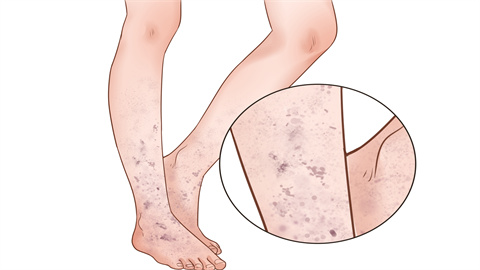What are the risks of capillary dilation?
Generally, telangiectasia refers to abnormal dilation and proliferation of capillaries on the skin or mucosal surfaces, presenting as red or purplish red punctate or linear patterns. Its main hazards include aesthetic impact, skin sensitivity, bleeding risk, infection隐患 (hidden danger), and psychological burden. Detailed analysis is as follows:

1. Aesthetic Impact: Telangiectasia commonly occurs on exposed areas such as the face and neck. The dilated blood vessels are clearly visible, forming red or purplish red patterns or spots. In severe cases, they may merge into patches, impairing the overall skin aesthetics. The affected area may gradually expand over time.
2. Skin Sensitivity: The skin barrier function in areas affected by telangiectasia is usually weakened, making it susceptible to external stimuli such as temperature changes, ultraviolet radiation, and cosmetic ingredients, which can lead to discomfort such as redness, itching, and burning sensations.
3. Bleeding Risk: The walls of dilated capillaries are thin and less elastic, making them prone to rupture and bleeding when subjected to minor friction, pressure, or impact. Common manifestations include small red spots or bruises on the skin. If telangiectasia occurs in areas such as nasal mucosa, it may lead to recurrent nosebleeds.
4. Infection Risk: When telangiectasia is accompanied by skin damage, pathogens such as bacteria and viruses can easily enter the deeper layers of the skin through the wound, causing local infection. Symptoms such as swelling, pain, and exudation may appear after infection. If not treated promptly, the infection may spread, increasing the risk of worsening skin inflammation.
5. Psychological Burden: Individuals who suffer long-term from aesthetic concerns and skin sensitivity may develop negative emotions such as anxiety and self-consciousness, leading to reluctance toward social interactions and even affecting daily life and work performance. Prolonged psychological stress may also indirectly impact overall physical and mental health.
It is recommended that individuals with telangiectasia pay attention to sun protection, choose mild and non-irritating skincare products, and avoid frequent friction or irritation of the affected area. In terms of diet, appropriate supplementation of nutrients such as vitamin C and vitamin E may help maintain healthy skin. Maintaining a positive mindset and reducing negative emotions is also important for physical and mental well-being.





